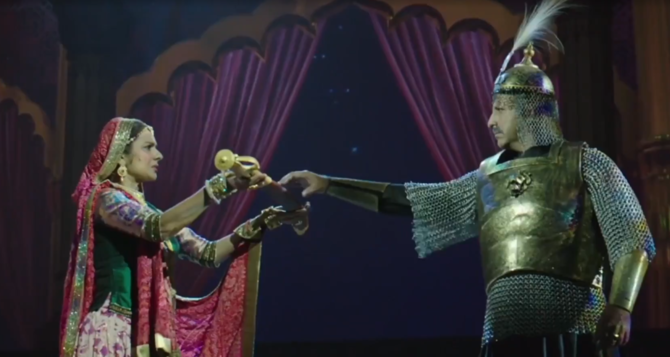DUBAI: The much-hyped Indian play “Mughal-e-Azam” (The Great Mughal) arrived in Dubai last week for a sold-out six-day run, the first performances outside of India.
Directed by Feroz Abbas Khan, and based on the 1960 epic Bollywood historical drama of the same name, it said to be the India’s most expensive theater production. While the cost of staging it is not known, the high production values and huge cast seem to justify the claim.
Dubai is the first international showcase for “Mughal-e-Azam” after more than 130 shows in India, mainly in Delhi and Mumbai, in the past two years. Taking such a grand production on an international tour cannot be easy. Dubai is the perfect first destination, given the comparative logistic convenience as well as the huge number of Indian and Pakistani expatriates, many of whom packed the eight performances at Ductac in Mall of Emirates.
Like the film it is based on, the play tells the fictitious love story of a Mughal prince and his courtesan. Grand sets, lavish costumes, and wonderful songs and dances notwithstanding, it was the powerful acting from an incredible cast, including Prithviraj Kapoor, Dilip Kumar, Madhubala and Durga Khote, that earned the film its reputation as a classic of Indian cinema.
As such, it is perhaps unfair to compare the theater production with the film, yet one cannot stop oneself from doing so.
Director Khan has tried to replicate the cinema version on stage — and yes, it is a treat to watch. It is a beautifully produced theater drama on almost every level, but the masterstroke is the inclusion of 3D projection. This recreates Mughal palaces, beautiful moonlit evenings and even the famous Sheesh Mahal (a palace courtyard filled with mirrors). Every background projection was flawless and the audience certainly got value for money in this regard.
Interestingly, there was minimal on-set furniture and few props. Yet the ambiance was beautifully created. Credit goes to the production team in its high-tech control center; there was not even the slightest glitch in the projections and lights. There was a two-second sound glitch in the middle of the play but it was brief and did not spoil anything.
The dances were the second-most beautiful part of the play. They were brilliantly choreographed and wonderfully performed by young "kathak" dancers, who were mesmerizing and seemed to enjoy every moment on the stage.
Let us not overlook the breathtakingly beautiful Mughal dresses, designed by renowned Indian fashion designer Manish Malhotra. Each and every character was clad in a beautiful outfit. It is perhaps fair to say that these bright, beautiful dresses compensated for the absence of props on the set. The set was more than adequately decorated with these dresses, the background projections and the lights.
The highlight of the two-and-half-hour-long play was the dance sequence for the song “Pyar Kiya To Darna Kya” (Why fear when you are in love?). The whole stage was transformed into poetry in motion.
Sadly, despite all the romanticism and glamour of the production, the overall performance of the main cast was not so impressive. Considering the epic story and classic film the play is based on, it is perhaps surprising that the cast featured such relatively unknown actors. This would have been ignored, had their performances justified their casting in such iconic roles. Unfortunately the acting was underwhelming and mostly disconnected. The first half in particular looked rather dreary because of the unimpressive stage presence of a few members of the cast.
The three main leads, playing Prince Salim, Emperor Akbar and Anarkali, were unable to do justice to the grandeur and charisma of the characters. Emperor Akbar on occasions could not pronounce the Urdu dialogue properly, whereas Salim lacked the charisma required for a charming and romantic, yet hot-blooded, Mughal prince.
The actress portraying Anarkali was a good singer but failed to impress as a dignified courtesan who sacrificed everything to save the love of her life. The actress playing Maharana Jodha Bhai is perhaps the only member of the main cast who justified her casting. Unfortunately, her scenes were few compared with the other three leads. That all said, the performances in the second half were much stronger and more crisp.
Though the live singing is a big selling point for the play, the overall quality was not overly impressive. Perhaps inevitably, many in the audience were comparing the cast of the stage version with Lata Mangeshkar and Mohammed Rafi, who sang the songs in the movie. It goes without saying that singing live on stage is brave and credit is due for making the attempt. The actress performing Anarkali especially deserves a round of applause for her efforts.
Little needs to be said about the story, script and even the direction because the stage version is a close copy of classic movie. Director Khan was smart enough not to experiment too much with the spirit and treatment of a classic.
The venue was perhaps not ideal to showcase such a huge production. There were moments when the stage looked cluttered, with dozens of dancers, soldiers and actors. Friends who saw the play in India were wondering how such a grand show could be replicated in what is a more compact community theater at Ductac. It is hard to escape the suspicion that it was perhaps scaled down to fit the venue. Maybe somewhere such as Dubai Opera or the Rajmahal at Bollywood Park would have been a better choice of venue.




























